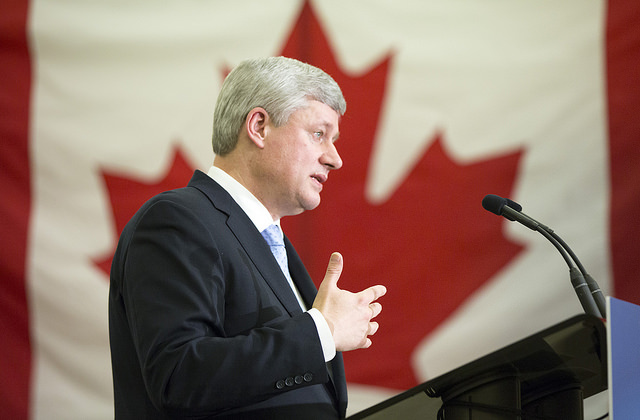Chip in to keep stories like these coming.
During the leaders’ debate this past Thursday, Conservative leader Stephen Harper stated, “The only time we’ve removed [health-care coverage] is where we have clearly bogus refugee claimants who have been refused and turned down. We do not offer them a better health-care plan than the ordinary Canadian can receive. I think that’s something that most new and existing and, and, old-stock Canadians agree with.”
Much has been rightly made of his use of the term “old-stock Canadians.”
Frank Graves, president of the polling firm EKOS Research, says Harper’s use of the term was a deliberate move intended to energize the Conservative base. Graves remarks, “It’s part of the deliberate strategy to sort Harper’s constituency from the rest of the electorate. It creates a sense of us versus others.”
Musician, broadcaster and university administrator Wab Kinew has condemned Harper’s comments by highlighting, “This country is founded on previous generations of people welcoming newcomers, dating back to the Indigenous people who welcomed the earliest immigrants. That should tell us to be compassionate and welcoming, rather than divisive and xenophobic.”
Beyond the divisiveness and racism in Harper’s comment, the prime minister was also misleading in his description of his policy on health-care coverage for refugees. The Globe and Mail reports, “Lost in the controversy is the fact that Mr. Harper’s comment about health-care coverage was inaccurate. The cut affected not only rejected refugee claimants but also claimants from what the government designates as ‘safe countries.'”
The Canadian Press specifies that the interim federal health program had covered “both basic and extended health-care costs like vision and dental care until refugees and refugee claimants could apply for provincial coverage…” Their report notes, “In 2012, the Conservative government overhauled the program… Now, for example, some privately sponsored refugees — such as many Syrians currently being admitted to Canada — do not get drug coverage but refugees directly sponsored by the government directly do. Coverage for those not yet declare refugees was also changed. …The 2012 changes saw coverage for things like eye care, dental or therapy cut and if their claim was rejected their coverage was further scaled back, according to whether or not they can be deported or if they had the right to appeal the rejection.”
This has been the subject of legal fights; fights the Conservative government have lost.
The article adds, “Following the 2012 changes, refugee claimants sued, arguing their charter rights were being violated. They won and the court ordered benefits for all to be re-instated.”
It should be emphasized that the Harper government’s changes to health care for refugees were found by the Federal Court of Canada to have violated Section 12 of the Charter of Rights and Freedoms which states, “Everyone has the right not to be subjected to any cruel and unusual treatment or punishment.” After that July 2012 ruling, Council of Canadians chairperson Maude Barlow tweeted:
Court rules against cuts to refugee health care! One more embarrassment for Harper. CBCNews.ca Mobile http://t.co/hKb5xIoXIO
— Maude Barlow (@MaudeBarlow) July 4, 2014
But even here, as the Canadian Press notes, “The government sought a stay of the decision pending appeal, but the court refused to grant it. So the Conservatives were forced to introduce a new health-care coverage plan, which doesn’t reinstate all the benefits but does give full coverage back to, among other people, children and pregnant women while they await a determination on their claim. The Federal Court of Appeal hearing on the case is scheduled for Oct. 26.”
The Council of Canadians has called for the full reinstatement of health-care coverage denied to refugees by the Harper government.
We encourage you to Go Vote on October 19.
Photo: pmwebphotos/flickr
Chip in to keep stories like these coming.




